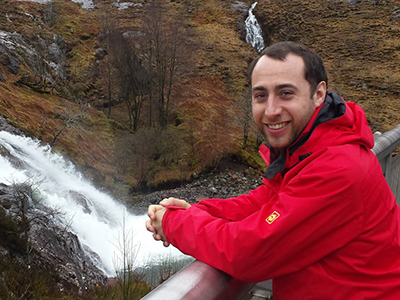
Edward Fisher
SSI fellow
The University of Edinburgh
Postdoctoral Research Associate, The School of Engineering, The University of Edinburgh
Interests
Ed’s interests include microelectronics and silicon design for signal processing and single-photon communication applications. His current work includes firmware and embedded software for optical tomography systems, however software best practices also have a direct effect on the design of CMOS silicon chips.
My work
Ed’s research now centres on instrumentation and measurement systems for tomography of gas species within industrial environments. One project, the FLITES project aims to image, at video rates, the spatial distribution of carbon dioxide and other pollutants within aero-jet engine exhaust plumes. The hope being that greener aviation can result from knowledge of the engine’s performance, fuel mixture, mixing with the atmosphere and the role of engine parameters. Depending on the signal processing required, and how this is handled locally prior to transmission to the user, hard real-time and adaptable software and firmware systems are required. Software best practices can also be applied to firmware, where data formats and correct clocking and management of digital circuits are paramount. As firmware is described using sequential textual languages, many software principals are directly relevant.
Ed’s background included single-photon detectors in standard CMOS technologies, the same technologies as smart-phone image sensors. The modern design flow of these technologies includes many areas where software is used and developed. For example, textual hardware description, can be synthesised into digital circuits with suitable timing and physical constraints for the placement and routing. Scripting languages are also used to automate, simulate and verify designs before the expensive steps of manufacture.
Unlike industry, academic software for microelectronic designs, and in particular firmware and embedded software, often lacks crucial best practices. This can cause issues with long term version control, or projects attempting to increase the TRL level. Paradoxically, if a 32-bit firmware register or wire is not declared the simulator may not show an issue, however synthesis onto hardware may render that wire as just a single bit, with zero errors. As part of this fellowship, Ed hopes to increase the uptake of industry and logical best-practices within academic CMOS and microelectronics design projects and teaching.
Online Presence
Ed blogs regarding interesting research, physics principals, firmware/software designs and the progress of his various projects . Ed’s main current academic project is the FLITES project. The Agile Tomography group, which Ed is a member, can be found at here.
Check out contributions by and mentions of Edward Fisher on www.software.ac.uk


